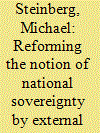| Srl | Item |
| 1 |
ID:
105550


|
|
|
| 2 |
ID:
119278


|
|
|
|
|
| Publication |
2013.
|
| Summary/Abstract |
In principle, national sovereignty is the right of a nation to govern its internal affairs without foreign interference. In practice, it is defined by one's interpretation of international law, which may permit legal external intervention under some circumstances, ultimately removing a nation's sovereignty. This paper will examine the current system of international law outlined by the United Nations, analyse the ambiguities contained within its Charter and elaborate on how external intervention can be justified. The case-study of recent developments related to Libya will demonstrate that the manner in which international law is interpreted is changing the notion of principles of sovereignty.
|
|
|
|
|
|
|
|
|
|
|
|
|
|
|
|
| 3 |
ID:
134208


|
|
|
|
|
| Publication |
2014.
|
| Summary/Abstract |
The end of the Cold War should also have meant the coming of the flourishing of international law, many (myself included) naively believed. However, the "uni-polar moment" that gained momentum in the 1990s, though its life-span turned out to be rather short, saw a gung ho attitude towards foundational principles of international law such as non-use of force and non-interference in internal affairs of states. NATO's 1999 operation over Kosovo, the 2003 invasion of Iraq, the 2008 Georgia-Russia war, policies reflected in the slogan "all the options are on the table", and now Ukraine's tragedy show that international law and morality are used mainly as covers in the geopolitical struggle. If the Cold War manifested the competition between two ideologies-capitalism and communism-today's main historical controversy is between the uni-polar and multi-polar visions of the world. It is not ideological, it is geopolitical, where ideology, morality and law are used as tools and collaterals in the struggle for the configuration of tomorrow's world. It is also a struggle for the nature of international law. Will it become a kind of supra-national law (à la EU law for the whole world) dictated from one centre, or will it develop as a legal system based on the balance of interests and values of different states and cultures? The author believes that the world is simply too big, complex and diverse for the first choice to realize in practice. Its rich tapestry cannot be flattened into a carpet where one pattern, be it of a Judeo-Christian, Anglo-Saxon, Confucian, Muslim or even secular liberal-democratic pattern, prevails. Attempts to force one, "the only true", vision on the whole world not only undermine international law; they are also utopian endeavours fraught with endless conflicts.
|
|
|
|
|
|
|
|
|
|
|
|
|
|
|
|